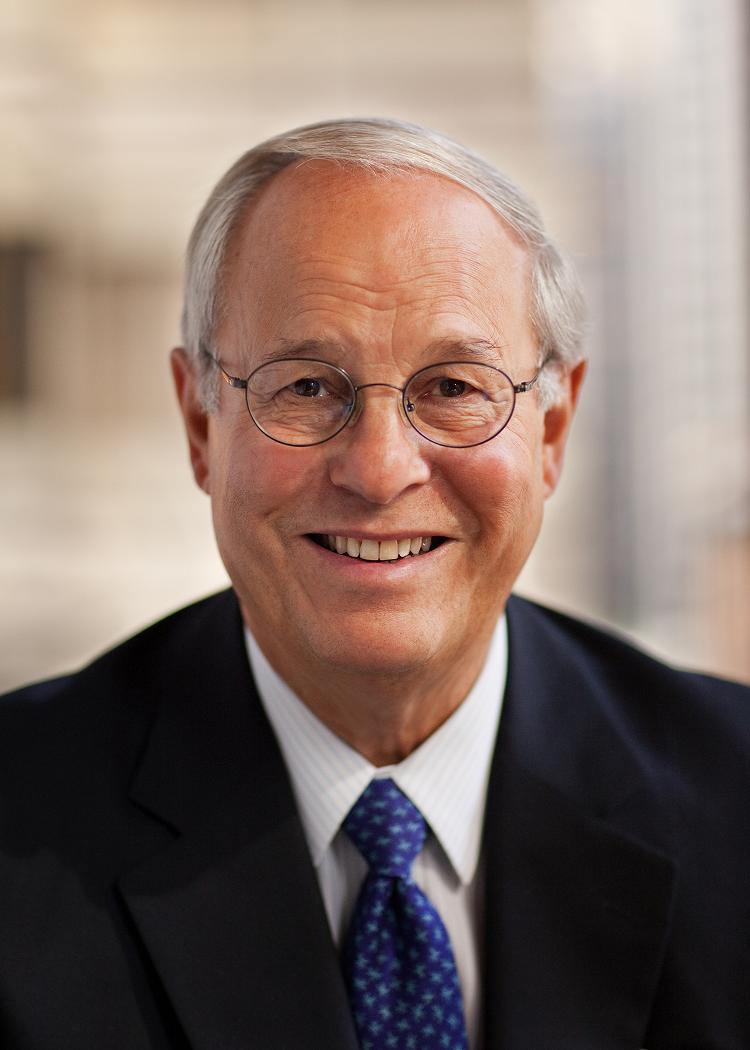 When Frank Fahrenkopf Jr. took the helm of the newly created American Gaming Association in 1995, the U.S. gaming industry had just begun to experience a tremendous wave of expansion that would spread across the country, and faced lingering misperceptions that the gaming industry remained a shady enterprise that contributed little good to society, and federal gaming commission scrutiny that threatened to potentially regulate and tax the industry. Fahrenkopf’s AGA ably navigated those rough waters and successfully guided the industry forward, along the way creating the National Center for Responsible Gaming as well as the Global Gaming Expo (G2E) and its Asian counterpart (G2E Asia).
When Frank Fahrenkopf Jr. took the helm of the newly created American Gaming Association in 1995, the U.S. gaming industry had just begun to experience a tremendous wave of expansion that would spread across the country, and faced lingering misperceptions that the gaming industry remained a shady enterprise that contributed little good to society, and federal gaming commission scrutiny that threatened to potentially regulate and tax the industry. Fahrenkopf’s AGA ably navigated those rough waters and successfully guided the industry forward, along the way creating the National Center for Responsible Gaming as well as the Global Gaming Expo (G2E) and its Asian counterpart (G2E Asia).
In January, Fahrenkopf announced he will step down from his post effective June 30, but
Many in the gaming industry and in politics expressed appreciation for his hard work over the years to protect and strengthen the industry. “There is no doubt that Frank’s political savvy has been instrumental in proteching and promoting our industry’s interests on Capitol Hill, but the impact of his leadership stretches well beyond Washington, “ Jim Murren, chairman and CEO of MGM Resorts International, said in a statement. “From the very start, he understood the need to unify the industry in addressing key issues like responsible gaming and diversity, programs that are at the cornerstone of how we do business. It hasn't always been easy to bring our disparate group together, but he did it. Frank's legacy at the AGA is testament to what we can accomplish together."
Gary Loveman, chairman, president and CEO of Caesars Entertainment Corp., said Fahrenkopf led the AGA with a unique understanding of both federal politics and the gaming industry. “He has established our association as the voice of a dynamic and controversial industry, and done so with integrity, grace and consistent focus,” he said in a statement.
Fahrenkopf discussed his tenure with the AGA with correspondent Marian Green.
Why did you decide that the time was right to step down?
Fahrenkopf: When I agreed to take the position as president and CEO of the AGA, I told the search committee, which consisted of Steve Wynn, Chuck Mathewson who was then the CEO of IGT and Raymond Avansino, who was then the president of the Las Vegas Hilton, that I would do it for one year to get them up and going. Well that was 17 and a half years ago. And I believe in jobs like this the important thing for the person who holds it is to do succession planning, and so my board and I two years ago began succession planning, and we eventually reached a decision in December2011 that I would step down in September of this year. We didn’t announce it then because we were still hopeful that Senator Reid and Senator Kyle would be introducing during 2012 an online poker bill so I didn’t want to make myself a lame duck during that and so we waited until after the lame duck session was over to announce the decision that had been reached. So like I said,
I’ve been doing it a long, long time, and I just felt it was the right time for me and for the association to have a change. And I’m not retiring. I’m going to go on and do some teaching, and I’m going to be doing some consulting and some writing. But everyone’s got to realize there’s a time, and my view was it was time for me to move on.
Think back to that time when the AGA first started. How was the industry perceived in the United States and abroad?
Fahrenkopf: Well, it was pretty tough sledding at the beginning. One of the things when I was hired was we wanted to change the perception of the casino gaming business in the country. And in fact to illustrate how difficult it was, one month after I came on board, “Casino” came out in the motion picture theaters. The movie just repeated the perception of the underworld and the illegal activity and so forth. We have worked very, very hard over a long, long period of time to establish that we’re part of the main economic stream in this country. We employ hundreds of thousands of workers, generating hundreds of millions of dolllars of tax revenue. I mean we’re not all the way there, but I think we’ve come an awful long way from where we were 17 and a half years ago. The interesting thing is just about the time that a reporter who’s assigned to cover the gaming industry really gets the hang of it and understands it and knows what’s going on, they get reassigned to another desk and we get a new reporter [and] the first thing they ask is “Well, does the mob still control the industry?” So it’s a continuing educational process, but I’ve got a director of communications over here Holly and she’s been with me for a long time and so she does a great job talking with them and I think we’ve come a long way in that regard.
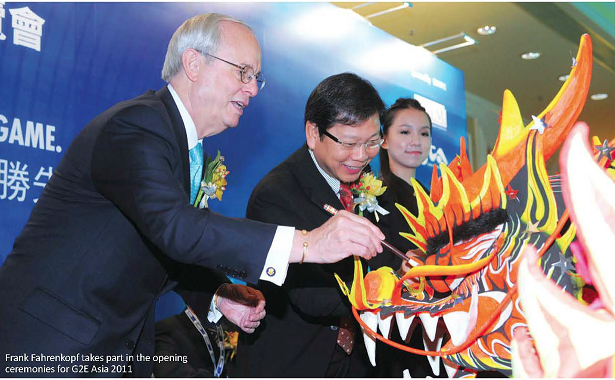
Was there something in particular that you think helped turn that around?
Fahrenkopf: If I had to go back and look at the entire situation as to what really started changing it, I would say it started years ago when we started having public companies being able to be licensed to operate casinos, mainstream companies, and then we had people like a Terry Lanni and Gary Loveman who would be on Wall Street to talk to Wall Street and Jim Murren who comes from Wall Street. That really helped us get by some of those old stereotypes.
Talk a little about what you view as your major accomplishments during your tenure.
Fahrenkopf: Number one is the National Center for Responsible Gaming. We faced the danger that the tobacco industry faced. One of the first meetings of the board I talked to them about that famous picture of all the chiefs of the tobacco companies with their right hands raised being sworn in by Henry Waxman on Capitol Hill where they all testified under oath that tobacco smoking was not a dangerous addiction, that it was not harmful to your health, and that we as an industry couldn’t afford to make that same mistake, and that therefore at that very first meeting, the board approved us to move forward with our responsible gaming program. And then I was fortunate enough to have the opportunity to meet Dr. Howard Shaffer of the head of the Division of Addictions at Harvard and I remember that first meeting and I think he was a leery of me, thinking that we just wanted a cover-up of some sort, and I was leery of him because I didn’t know what the numbers were going to be. But we created an arms-length relationship, and we began what I think has really been a great story. Because even the opponents of gaming now have to admit that the NCRG is an independent institution. The industry provides the funding, but the research we do is peer-reviewed and we use the same protocols as the National Institutes of Health and the conference we hold every year draws the leading doctors, physicians, scientists, researchers and caregivers from around the world, and it really has become the good housekeeping stamp of approval as to responsible gaming around the world. So that clearly to me is one thing I’m very, very proud of. We stepped up as good corporate citizens and hopefully we’re able to help that 1 percent that’s not able to gamble responsibly.
The other I guess would be a broader one. When we were created at that time we were always afraid of federal regulation and federal unfair taxation. And I’m happy to say — We also had very strong support on Capitol Hill to help us in this — we came through in the last 17 and a half years in very, very good shape in that regard. And then third was the big threat to the gaming industry, and that was the federal gaming study commission that was created in the late ‘90s. The sponsors of the bill to create that commission didn’t leave any doubt that their intent was to close down legal gaming in the United States. And we for two years with our minimal staff — you know we never had more than 10 people working here — we followed that commission around the United States and made sure we had witnesses to rebut some of the unfair allegations that were made by the anti-gaming community and others, and when that final commission report came out in 1999, the commercial casino industry came out looking really good. And so we were very, very pleased with that because I think the people who thought that they were going to put together a commission felt that when it was over they were going to be able to use the findings of that commission to do us some real harm in the federal arena.
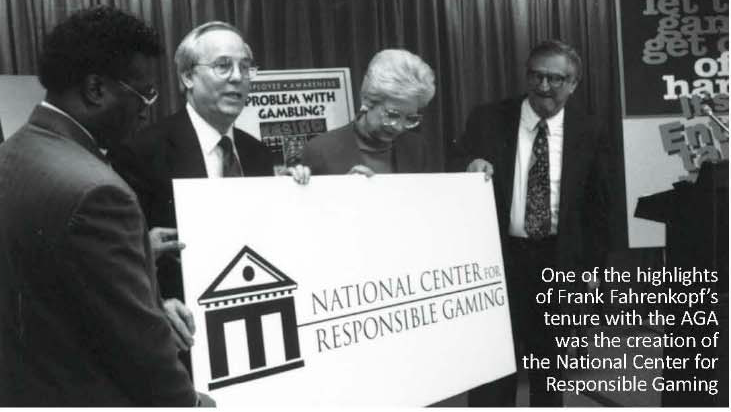
You were instrumental in making sure that commission had some representation for the gaming industry on that commission.
Fahrenkopf: Oh absolutely. We worked very hard to get Terry Lanni from the MGM on it, to get John Wilhelm, who led the Culinary Union back then and of course had many, many people working in our industry, and Bill Bible, who was then the head of the Nevada Gaming Control Board on it. But there were six other people who I don’t think favored gaming in any way. So it was very important to have people of the caliber of Lanni and Bible and John on that commission.
Back to responsible gaming for a minute, do you think that the gaming industry is doing enough?
Fahrenkopf: I think we’re doing fine. I think the challenge, particularly in the responsible gaming area, is going to be with the digital world, and how we’re going to be able to perform in the digital world. Now we don’t know what the digital world is going to look like. We don’t know if the federal legislation is going to be passed, which we hope there is because we think that federal legislation will set some minimal standards that will set some protection for underage gambling, and responsible gaming. Our position is that if there is no poker bill that state by state [internet wagering bills will be passed]. We now have three states that have approved some form of internet wagering. [The danger is] you’ll have a hodge-podge of legislation or what I call a race to the bottom from one state to the other trying to attract business. So we’re still hopeful that the final picture is going to have a federal presence.
What gives you hope that that’s going to happen?
Fahrenkopf: Well, the hope is that I think that’s what’s happened in Delaware, what’s happened in New Jersey and Nevada and what seven or eight other states have gaming bills on their legislative agendas is that some of the normal opponents of all sorts of gaming are going to open their eyes and say, “Wait a minute here, I didn’t like that poker bill because I thought it was expansion of gaming” but [realized] it was not an expansion of gaming, it’s a restriction of gaming. It’s going to restrict it only to poker, rather than having these states one after another having what I call, and I believe it to be true, what could be the largest gaming expansion in the history of the United States. Some of these bills passed in New Jersey and Delaware it’s not only poker, it’s all types of casino gaming. …I’m hoping some of these [gaming opponents] are going to see what [Sen.] Jon Kyl saw and the reason that he worked with Harry Reid for so many years trying to come up with a poker bill. Sen. Kyl historically has been an opponent of gaming, but he felt that a bill that just allowed poker, which is different than most other games, there’s a great heritage and tradition of playing poker in our country, and it’s not a house-banked game. That differentiates it, and by allowing poker and closing everything else was a trade that was in the best interest of this country. So we’re hoping that more and more of the normal opponents will see it as Senator Kyl saw it, and we’ll be able to get it done. Senator Reid has placed it on the top of his agenda, and I’ve talked to Senator Barton of Texas who is interested and he’s talked to some of his colleagues on the House side, and I’m hoping he’s going to introduce something.
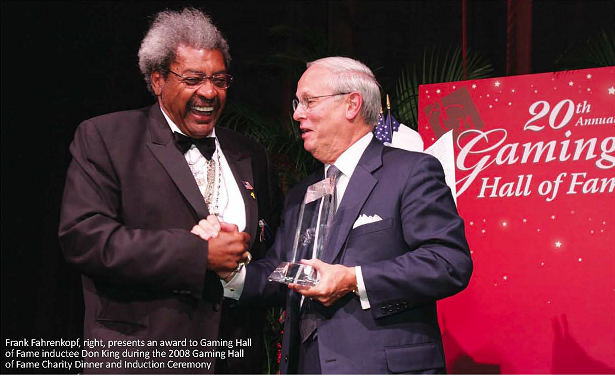
What other major challenges face the industry going forward?
Fahrenkopf: There’s kind of an interesting one that kind of snuck in under cover and that’s internet cafes. These internet cafes are all over the country and are just jokes from the standpoint that people come in and they supposedly buy a card that has telephone time on it and they’re not really buying the card for telephone use, they’re buying the cards so they can play online gaming for prizes and points and so forth. And this has become a multi-billion-dollar business across the country. So you’ve got a lot of states paying close attention to this issue. North Carolina has already moved to close them down in that state, and Ohio is now looking at it very, very closely. They are clearly competitive with the brick-and-mortar casinos. They are clearly competitive with Native American gaming. They’re clearly competitive with lotteries and they’re competitive with the pari-mutuel industry, so it’s something that’s drawing the whole industry together to try and do something about it.
So do you believe something will get done about that?
Fahrenkopf: I do. We’ve put out a white paper that we’ve sent out all across the country to attorney generals, outlining what’s going on and the legislative needs, and so we’re hopeful that over the next six or eight months we’re going to see a whole lot of action across the states.
How important has it been for the AGA to create the two gaming shows, G2E and G2E Asia?
Fahrenkopf: Those shows, number one, have been a big revenue producer because when the downturn hit in 2009 there were no dues paid because the industry was really hurting. Thankfully because of the shows I was able to build up a surplus [over the years] that I was able to use to keep us operating, and we’re still on half dues from where we were in 2008, but now these two shows have been able to grow and expand and provide revenue to us. And number two what we’re really proud of is the educational function that we’ve put in. This is not only a tradeshow but we’ll run 200 seminar sessions on issues of real importance to people who are working in the industry. We’ve been able to bring in financial institutions so the investment banking industry can hear from our leaders. So we’re very, very proud of that, and the move to the Las Vegas Sands from the convention center was really a home run. We’re very, thankful for the years we had at the Las Vegas Convention Center, but the facilities at the Sands are just fantastic. The shows have been very, very important, and I’m very proud of the job that we’ve done. And I’m very proud of the partnership we’ve had with Reed Exhibitions for all these years. That’s been a very, very good and harmonious relationship.
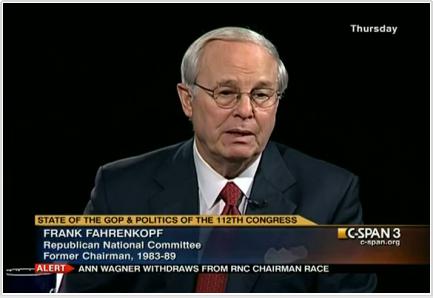
You’ve really expanded the breadth of the convention.
Fahrenkopf: Yeah, it’s just been amazing how it’s expanded. The interesting thing is for a couple of years we couldn’t get anyone from the internet space to come over and show because they were all afraid they’d get arrested. That part of it has now opened up and has been a real contribution.
What would like your legacy with the AGA to be?
Fahrenkopf: You know, I hope [the AGA] just continues to serve what I think is such a vibrant, interesting industry that provides so many jobs. And you know we never really get credit for it, but some of the jobs we’ve provided, particularly when we started the riverboat portion of our industry in the Midwest is that we tend to be an industry that hires a lot of people who are on the low end of the education barrier who really need jobs and [who often don’t have the necessary training, so the industry provides training and benefits). I’m really proud of that. [The industry doesn’t always] get credit for all the tax revenue we generate. Some of the states that have our industry, I wonder what kind of fiscal shape they would be in after the crash of 2008 if we hadn’t been there providing those resources for us.
Hopefully we’re coming out of this [economic] crisis. I think the Genting purchase, for example, out in Las Vegas is great for Vegas. We’ve been struggling with construction jobs, so for a lot of people who were out of work, there will be new construction jobs and new construction, and people working in the casino, and these things turn over in a community. It’s very positive. I hope that continues. I hope we continue to grow the responsible gaming portion of this. I’m just happy with the track we’re on.
Can you talk a little about relations with organized labor? I know there are some battles going on with the Culinary union and with Sheldon Adelson and Station Casinos.
Fahrenkopf: By and large, we’ve had a very, very close, amicable working agreement with the labor unions that deal with us. There are some exceptions. You’ve mentioned Stations and Las Vegas Sands over the years had not had good relations, and there are constant battles that still go on. There were some problems in Atlantic City with some of the labor organizations that had traditionally represented the automobile workers. But you’re never going to have unanimity with an industry as large as ours with so many different companies that have their own cultures. But I think that by and large, organized labor would say that the gaming industry is an industry that they would give an A or an A- for the vast majority of very, very good working arrangements.
Whom would you like to see succeed you?
Fahrenkopf: Well, that’s not for me to say. I went out and got three headhunter firms out here in Washington, that specialize in trade associations. There’s a search committee that’s been created on the board, and they chose one of the three firms [Korn/Ferry International]. We have been receiving large numbers of applications and resumes, and the search committee has begun the process of doing some interviewing. I’ve asked them if possible to get a final choice hopefully by the end of April, no later than that, so that whoever’s chosen, even though they won’t come in until July 1, could maybe go with me to Macau in May so that he or she will be able to be with me, going through what I do at G2E Asia and then they’ll come on board July 1 and I will stay for at least six months as a consultant.
Do you think it will be someone from the industry?
Fahrenkopf: No, not necessarily. In fact, I would be surprised if it’s someone from the industry because the important requirement for this position is it’s got to be someone who knows their way around Capitol Hill. I mean the number one requirement of my job here is relationships between our companies, with the Congress of the United States, with the executive branch, with the Internal Revenue Service, the FBI, the Treasury those federal agencies that interface with our industry. I’ve been around Capitol Hill now for 30 years. That’s the number one requirement. It’s a little difficult to find someone from our industry who has that qualification.
How is your relationship with the Obama administration?
Fahrenkopf: I think I’ve gotten to know the president fairly well because you know I chair the commission on presidential debates. I have seen him through six debates over the last five years and have a very cordial relationship with him. And I don’t at this time see this administration in any way being anti-gaming or trying to hurt the industry . The major battles that we fight day in and day out are with the 535 members of Congress, all of whom believe they should be president of the United States. So that’s where the rubber meets the road, and we spend a lot of time on that. And believe it or not, we spend a lot of time at the Coast Guard [because of the riverboat gaming sector]. There’s a lot of intricacies of what we do that most people never think of.
Any other parting thoughts?
Fahrenkopf: I’m just tremendously proud of the staff I’ve had here. As I mentioned Judy Patterson has been with me for 17 and a half years, and two or three others who have been here for 10 years or so. We’re a small staff, and they have just done a remarkable job with limited resources at times. And I’m proud of what we’ve done and hopeful that it will continue.






























